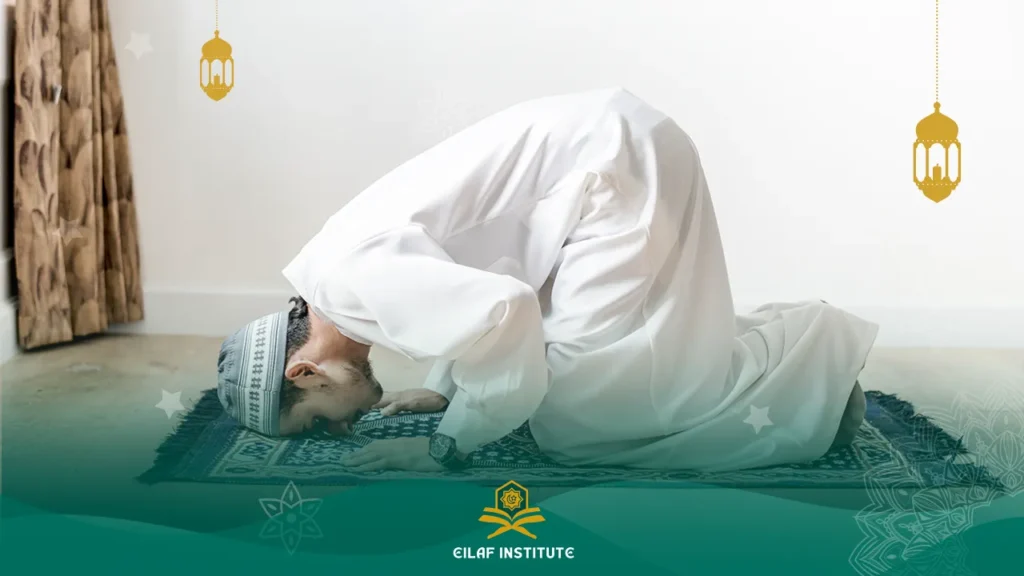Sujood, the act of prostration in Islamic prayer (Salah), is one of the most profound and intimate moments a Muslim experiences with their Creator, Allah. It’s a position of ultimate humility and closeness.
Many new Muslims, and even those practicing for years, often wonder, What Do Muslims Say In Sujood? and “What is the deeper sujood meaning?” This guide will clearly explain what to say in sujood, including the essential recitations in Arabic, their meanings, and how to make your sujood even more spiritually fulfilling.
Understanding Sujood: The Act of Prostration
Before diving into what do we say in sujood, it’s important to understand what is sujood in islam. Sujood (سجود) is the Arabic term for prostration. In the context of Islam, it refers to the act of placing one’s forehead, nose, both palms, both knees, and the tips of both feet on the ground in worship of Allah.
The meaning of sujood goes far beyond a physical posture. It symbolizes:
- Complete Submission: Acknowledging Allah’s greatness and our dependence on Him.
- Utmost Humility: Placing the most honored part of the body (the face) on the ground.
- Closeness to Allah: The Prophet Muhammad (peace and blessings be upon him) said, “The nearest a servant comes to his Lord is when he is prostrating himself, so make plentiful supplication then.” (Sahih Muslim)
Understanding this significance helps us appreciate the words we utter during this sacred act.
Read also about: What to say after allahu akbar in salah?
The Essential Recitation: What Do Muslims Say in Sujood?
So, what to say in sujood as a core part of the prayer? The most common and highly recommended phrase to recite is:
سُبْحَانَ رَبِّيَ الْأَعْلَى
What to say in sujood in Arabic: Subḥāna Rabbī al-Aʿlā
Transliteration: Subhaana Rabbiyal-A’laa
Translation: “Glory be to my Lord, the Most High.”
What Else Can I Say During Sujood?
Beyond “Subhaana Rabbiyal-A’laa,” what to say during sujood can also include personal supplications (Du’a). As mentioned in the Hadith, sujood is a prime time for your prayers to be answered.
Making Personal Du’a: Beyond the Essential Recitation
Here’s what you should know about making Du’a in sujood:
- After the Tasbeeh: It’s best to make personal Du’as after completing the standard recitation of “Subhaana Rabbiyal-A’laa.”
- Du’as from Quran and Sunnah: The most meritorious Du’as are those found in the Quran or taught by the Prophet Muhammad (peace be upon him). Examples include:
- اللَّهُمَّ اغْفِرْ لِي ذَنْبِي كُلَّهُ، دِقَّهُ وَجِلَّهُ، وَأَوَّلَهُ وَآخِرَهُ، وَعَلَانِيَتَهُ وَسِرَّهُ
- Translation: “O Allah, forgive me all my sins, small and great, first and last, open and secret.” (Sahih Muslim)
- يَا مُقَلِّبَ الْقُلُوبِ ثَبِّتْ قَلْبِي عَلَى دِينِكَ
- Translation: “O Turner of hearts, make my heart firm upon Your religion.” (Tirmidhi)
- اللَّهُمَّ اغْفِرْ لِي ذَنْبِي كُلَّهُ، دِقَّهُ وَجِلَّهُ، وَأَوَّلَهُ وَآخِرَهُ، وَعَلَانِيَتَهُ وَسِرَّهُ
- Personal Needs in Any Language: If you have particular personal needs, you can make Du’a in your own language from the heart. While Arabic is preferred, Allah understands all languages. Focus on sincerity and concentration.
Sincerity is Key: Regardless of the words or language, the most important aspect is the sincerity and humility with which you address your Lord.
Try to book our islamic studies courses now.
The Etiquette and Experience of Sujood
To fully benefit from what you say in sujood, it’s helpful to be mindful of its etiquette:
- Correct Posture: Ensure all seven points of contact are on the ground.
- Tuma’ninah (Calmness): Perform sujood with calmness and without rushing. Take your time to say the remembrances and make Du’a.
- Focus and Concentration: Try to clear your mind and focus on the meaning of your words and your connection with Allah.
The experience of sujood is meant to be one of peace and profound spiritual connection. It’s a moment where the servant is closest to their Lord, pouring out their heart, seeking forgiveness, guidance, and mercy.
In Conclusion: The Power of Your Words in Sujood
Understanding what to say in sujood enhances the quality of our prayers and deepens our relationship with Allah. From the essential “Subhaana Rabbiyal-A’laa” which glorifies our Lord, the Highest, to the personal Du’as that pour forth from our hearts, every word uttered in this state of humble prostration carries immense weight.
The definitive answer to What Do Muslims Say In Sujood involves glorification and heartfelt supplication. This ultimate act of submission defines What Do Muslims Say In Sujood.
Remember that sujood is not just a ritual; it’s a direct line of communication with the Divine. Embrace these moments, for they are among the most blessed opportunities to draw nearer to Allah and seek His favor.
Sources:

